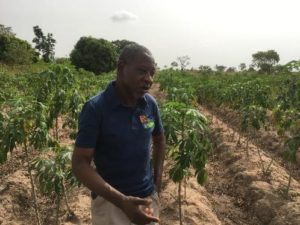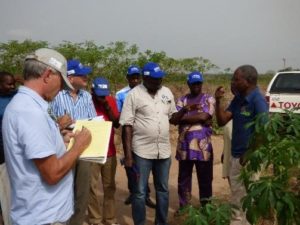In March of 2019, we visited Village Seed Entrepreneurs (VSEs) in Benue State, Nigeria, that were established as a part of the Building a Sustainable, Integrated Seed System for Cassava (BASICS) project. BASICS is funded by the Bill and Melinda Gates Foundation and is being led by the CGIAR Research Program on Roots, Tubers and Bananas. We were pleased to see significant progress in turning cassava stems into a profitable business, that will benefit thousands of farmers with access to improved varieties. We were hosted by Emmanuel Azaino, Head of Unit, Agriculture and Economic Growth at Catholic Relief Services (CRS). As a key component of BASICS, CRS is creating demand for the new varieties and supporting business development by the VSEs. We saw good evidence of progress in both areas during our visit.
Creating demand
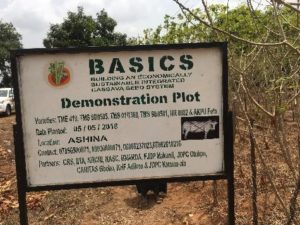
Sign with information about the plot. The NGO Justice, Development and Peace Commission (JPDC) works with ADPs to support the VSEs.
In Benue, we visited a well-prepared demonstration plot of new varieties in Ashina village. This had the five varieties being sold by VSEs and a local check variety (Akpu-Fefa) for comparison, all clearly laid
out and labeled. The demo plot was located just 10 meters from the main road from Makurdi to Aliade where everyone passing by could see the field and its large, informative sign. This demo was organized with the Agricultural Development Program (ADP). It was one of 50 demo plots in Benue State all with the same five varieties being promoted and check variety for comparison, strategically placed beside main roads where passing farmers could see them.
Emmanuel explained that CRS and their partners have been innovating with their outreach style. They switched from promoting the new varieties during field
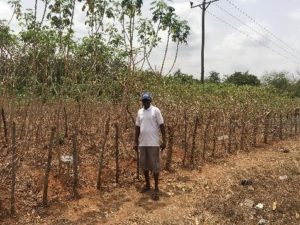
Each local government area has one extension agent. Michael Nomhwangi the ADP extension agent commented: “Farmers prefer 419, it produces big and has a lot of starch”. He said they also like NR 8082 “but it has too much water”
days, where farmers are expected to visit, to promotions during market days where farmers are congregating: “we showed up at traditional market days where we created a scene to attract attention with a procession and dancing. Then we had a presentation about the five varieties and VSEs. We showed farmers the roots of the varieties and had bundles for sale. We held 51 market day promotions in 2018”. Going to the market is livelier, and likely to reach more people.
Business development
On another stop, during our visit, we met John, a VSE in Benue State, who receives support from the local ADP. He planted his one-hectare field with TME 419, one of the most popular improved varieties. He bought stems to plant the field from a foundation seed producer in 2016. He planted at a density of 1m x 0.5m using about 100-120 bundles which is double the usual density, as he specializes in stem production. He sold 344 bundles in 2017, then he ratooned the field and sold more bundles in 2018. One farmer bought 100 bundles at about USD2 per bundle. He processed the roots from this field himself and produced gari for sale. John said, “if you harvest from double density planting at 12 months there are few roots, but at 15-16 months yields are very appreciable”. CRS records show that he made a profit of about USD 1,900 over two years. Specialized stem producers need a few innovations, such as dense planting and ratooning, which they have learned from BASICS.
Another VSE, Bridget, had planted 1 ha of TME 419 in June 2018. She also had TMS 98/0505 and TMS 30572 still in the ground from which she had already sold roots and bundles of stems. She said she had already harvested 65 bundles from these. She also had TMS 30572. She explained that farmers have plenty of TMS 98/0505 and TMS 30572, they want TME 419 which is new. She also planted Akpu-Fefa, the most important local variety, so she could show the difference in yield. This variety yielded very little compared with TME 419. She explained that she would like to expand her business, but available land was too far away.
After the field visits, we went to a lively farmers’ meeting at Ahumbe attended by VSEs, their customers, ADPs, JDPC, leaders of five chapters of VSE (Makurdi,
Gboko, Otukpo, Katsina, and Adikpo) and leaders of the apex network which groups and supports all the chapters. This shady spot in the village of Ahumbe is a central point that is regularly used for large meetings.
During the field visits we had met VSEs, but now we also had a chance to meet their customers, including Ruben, who explained, “the VSE sold stems to me and I planted as instructed. The germination of “sticks” (stem cuttings) of TME 419 was wonderful, growth was wonderful. If I told my neighbors I feared they would cut the stems. I kept the thing quiet. Then the soil started cracking as the roots swelled. The roots were immense. But the stems may expire in 3 years, that’s a problem for me.” Hopefully, Ruben will be able to return to the VSEs in 3 years, when he needs stems.
Farmers concerns
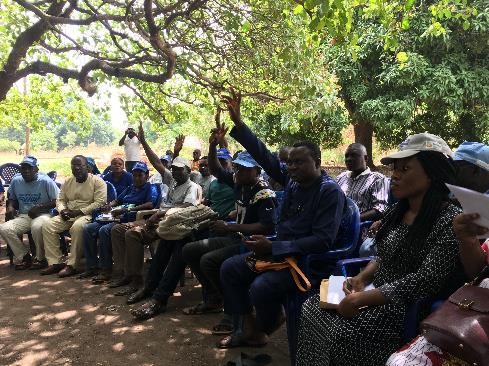
Farmers expressed that they need more training in weed management. “We need household machines to press cassava for processing. We need more assistance from ADPs and support for fertilizers”
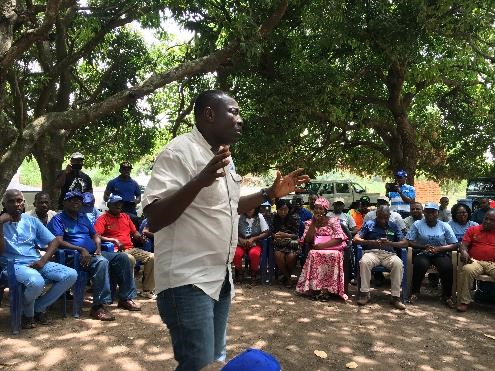
Farmers asked what would happen when the project ends. Emmanuel explained that the VSE network was created to support seed businesses after the project ends.
Conclusions and recommendations from our visit:
Business case
- People are making money from stems; much of the business is around acquiring new varieties, especially TME 419, but also TMS 98/0581, and TMS 98/0505. Some farmers also buy stems from VSEs as they harvested their roots during the dry season to benefit from high market prices and so their own stems had all dried out.
- The straight stem and tall plant make TME 419 stand out and be distinguished from other varieties. Straight stems are easier to make into bundles and transport.
- The variety name “419”, which is a well-known penal code in Nigeria, also helps the name to resonate in people’s minds.
- VSEs in all cases run a mixed operation of stem sales supplemented by root production, typically processed at home.
VSE model
- A good market for the TME 419 has given the VSE model strength.
- VSE support depends upon collaboration amongst local partners such as the ADP.
- VSEs agreed that NASC certification was worthwhile because it gave them status and proof that they were authorized.
- Many women are active as VSEs and are empowered to speak up, expressing their points of view in public meetings such as during our visit.
Business support
- CRS and partners successfully support the VSE businesses and are appreciated by the VSEs. The demonstration plots are strategically located, well maintained and clearly labeled, with easy-to-read signs that list the varieties being tested and the planting date. Looking at the wide demand for TME 419, CRS has decided to increase its production and placed orders for more foundation seeds of the variety for future planting.
Recommendations
- Consider options for improved marketing of varieties
- Catchy names for the varieties
- Opportunity to use the “419” name as it is well known in Nigeria (as the criminal code section against the advance fee fraud!) as a device for marketing e.g. creating a marketing slogan to be used in promotional campaigns such as “419 cheats yield”.
- Adapt and update the IITA user manual of agronomic practices including recommendations for different varieties e.g. TME 419 which has tall stems and needs ridging and deep planting as otherwise it may be blown over.
- Create widespread awareness amongst farmers about the economic benefits of using certified stems of improved varieties.
Written by Graham Thiele, Michael Friedmann, and Hemant Nitturkar.
